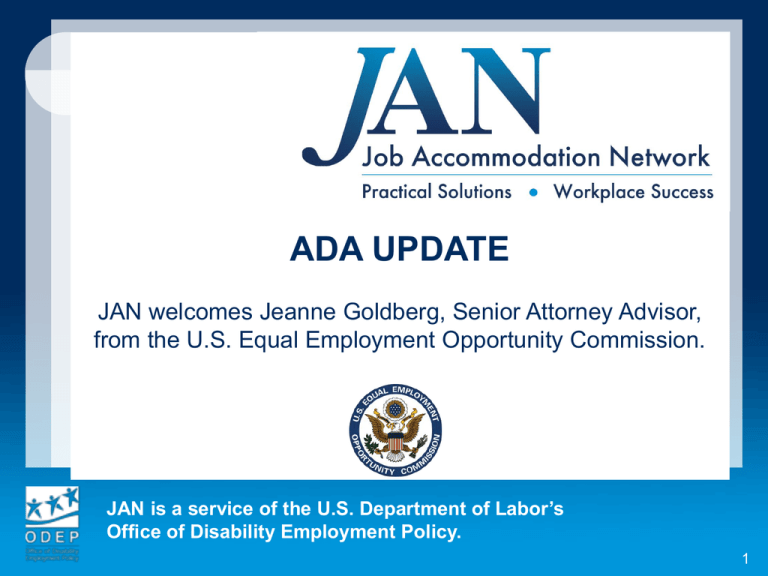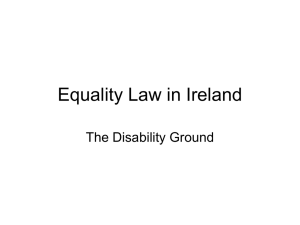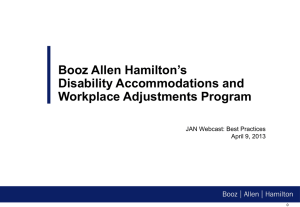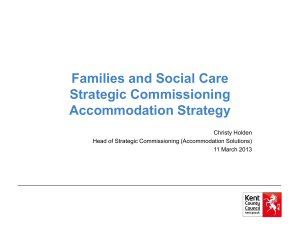Recent Case Illustrations - Job Accommodation Network
advertisement

ADA UPDATE JAN welcomes Jeanne Goldberg, Senior Attorney Advisor, from the U.S. Equal Employment Opportunity Commission. JAN is a service of the U.S. Department of Labor’s Office of Disability Employment Policy. 1 ADA Update See earlier JAN webcasts reviewing recent ADA case law: October 9, 2012 - ADA Update: http://askjan.org/Webcast/archive/index.htm April 3, 2013 - Best Practices in the Employment of People with Disabilities in the Federal Government: http://askjan.org/webcast/archive/indexfed.htm# Mar13 Basic Provisions Protections for individuals with disabilities No disparate treatment or harassment based on a physical or mental impairment (as long as not both transitory and minor) Reasonable accommodation absent undue hardship (for impairments that substantially limit a major life activity) Qualification standards that screen out an individual based on disability must be jobrelated and consistent with business necessity 3 Basic Provisions Protections for all applicants and employees of covered entities: Rules about when employer can ask for medical information, and how much (“disability-related inquiries and medical exams”) Medical information kept confidential No retaliation 4 Qualified Employer never has to retain an employee in a position if not “qualified.” To be “qualified,” employee must satisfy the requisite skill, experience, education, and other job-related requirements, and be able to perform the essential (or fundamental) functions of a position (with accommodation, if needed). 5 Qualified This issue most often arises when: Employee requests to be excused from performing job duty due to medical condition; or Employer believes employee is not able to perform job duty due to medical condition 6 Qualified Employer never has to eliminate an essential function of a job as an accommodation. Employer never has to or lower production standards (quantity or quality) as an accommodation. Individualized assessment: Do not make assumptions about what an applicant or employee can or cannot do based on their medical condition. 7 Qualified But remember: Employee can be “qualified” even if needs accommodation to perform the job. 8 Essential Functions Relevant information in determining whether a function is essential may include: Employer’s judgment Terms of a written position description Terms of a collective bargaining agreement Experience of current or past employees Amount of time spent performing the function Consequences of not performing the function 9 Essential Functions If accommodation requested involves removing a duty, is it an essential function? If so, it need not be removed, but can employee be accommodated to perform it? If employee cannot be accommodated in current position, can he be reassigned to a vacant position for which he is qualified (the accommodation of last resort)? 10 Safety and Fitness Concerns Direct Threat: An employer may reject a job applicant or exclude an employee with a disability from a particular position if the person poses a direct threat to health or safety (i.e., a significant risk of substantial harm to self or others) NOTE: An individual is not a “direct threat” if there is a reasonable accommodation the employer could provide absent undue hardship that would reduce the risk below this level 11 Assessing Direct Threat What to consider: The particular applicant's or employee's present ability to safely perform the essential functions of the job based on objective evidence and reasonable medical judgment The duration of the risk, the nature and severity of the potential harm, the likelihood that the potential harm will occur, and the imminence of the potential harm 12 Recent Case Illustrations Majors v. General Electric Co. (7th Cir. April 16, 2013) (employee with lifting restrictions not qualified because she could not lift heavy objects, which the court found to be an essential function of her auditor position; because it was an essential function, it would not be a reasonable accommodation to have another person perform the task for her). 13 Recent Case Illustrations Keith v. County of Oakland (6th Cir. Jan. 10, 2013) -- deaf individual who passed employer’s own life guard training and certification program may be qualified as life guard with accommodations; county may have violated the ADA by rescinding its conditional offer of employment based on recommendation of doctor it hired to conduct post-offer medical exam, who without an individualized assessment stated “he’s deaf; he can’t be a lifeguard” -- expert witnesses explained that in noisy swimming areas, recognizing a potential problem is almost completely visually based -- testimony was also offered by an associate professor from Gallaudet University who had certified 1,000 deaf lifeguards through American Red Cross programs, and who noted that the world record for most lives saved by a lifeguard is held by a deaf man, who saved over 900 lives in his lifeguarding career 14 Recent Case Illustrations Olsen v. Capital Region Medical Center (8th Cir. May 7, 2013) (in light of uncontrolled frequent seizures notwithstanding employer’s attempted accommodations, plaintiff was not qualified to work as mammography technologist, which included operating sophisticated medical machinery and tending to the physical and emotional needs of patients). EEOC v. Western Trading Co. (jury verdict of $109,000 entered March 10, 2013) (employer discriminated against new retail employee when it refused to allow him to return to work following a seizure at work and one during off-duty hours, notwithstanding repeated releases from his doctors). 15 Recent Case Illustrations Szarawara v. County of Montgomery, 2013 WL 3230691 (E.D. Pa. June 27, 2013). -- application of amended EEOC regulations -- plaintiff's diabetes likely a substantially limiting impairment -- qualified: job description requirement to work “various shifts” and “rotating schedules” does not automatically mean working night shift is “essential function” -- accommodation: employee did not have to exhaust other health measures before asking for accommodation at work 16 Recent Case Illustrations Koessel v. Sublette County Sheriff’s Dept. (10th Cir. May 14, 2013) (patrol officer who had stroke was not qualified due to cognitive limitations that became apparent after he returned to work). McElwee v. County of Orange, 700 F.3d 635 (2d Cir. 2012) (“…under the ADA, workplace misconduct is a legitimate and nondiscriminatory reason for terminating employment, even when such misconduct is related to a disability. A requested accommodation that simply excuses past misconduct is unreasonable as a matter of law.”) 17 Accommodation Requests Recognizing Accommodation Requests: Accommodation request is a request for some sort of change for a medical reason; request need not be in writing and need not contain any “magic words” “Tips” for recognizing requests 18 Timing of Requests Request may be made at any time during the application process or during employment, including if the employee is having performance difficulties But accommodation is always prospective – request is too late once performance or conduct warrants termination An employee does not lose the right to request an accommodation because he did not do so during the application stage Employees may make more than one request for reasonable accommodation 19 Disability Does the Requesting Employee Have a Disability? When considering if an individual who has requested accommodation has an impairment that “substantially limits a major life activity” or has a record of same, remember the changes made by the ADA Amendments Act of 2008 Now the definition of disability “shall be construed broadly” and “should not demand extensive analysis” 20 Disability Congress Made 4 Changes To “Substantially Limited in a Major Life Activity”: 1. Need not be a “severe” limitation or “significantly restricted” 2. Major life activities include “major bodily functions” 3. Ameliorative effects of mitigating measures not considered 4. Impairments that are “episodic” or “in remission” are substantially limiting if they would be when active 21 Pre-ADAAA Case Law Don’t Rely on Pre-ADAAA Case Law on Coverage See EEOC revised ADA regulations 29 C.F.R. Part 1630 and Q & A: www.eeoc.gov/laws/regulations/adaaa_qa_s mall_business.cfm See webinar handout with examples of postADAAA case law 22 Medical Information When and How Much Medical Information Can the Employer Ask for in Support of An Accommodation Request? ADAAA has not changed the legal rules regarding when and how much medical information employers can request if accommodation is requested. If not obvious or already known, an employer may obtain reasonable documentation that an employee has a disability and needs the accommodation requested. 23 Medical Information Employer may ask employee to obtain information from treating health care provider, or ask employee to sign limited release allowing employer to contact doctor directly. For example, employer might seek to verify diagnosis and limitations, follow up to clarify limitations as well as what accommodation might be effective, and for how long it may be needed. 24 Examples of Accommodations Physical modifications Sign language interpreters and readers Assistive technology and modification of equipment or devices Modified work schedules Making exceptions to policies Job restructuring (swapping or eliminating marginal functions) Changing supervisory methods Job coach Telework Leave Reassignment to a vacant position (last resort) 25 Actions Not Required as an Accommodation Lowering production or performance standards (but prorate production requirements for period of leave as an accommodation, and provide accommodation if requested to meet the standards) Excusing violations of uniform conduct rules that are jobrelated and consistent with business necessity (but provide accommodation if requested to meet the standard) Removing an essential function Monitoring an employee’s use of medication Providing personal use items Changing someone’s supervisor (though changing supervisory methods may be required) Actions that would result in undue hardship (i.e., significant difficulty or expense) 26 Undue Hardship Factors: Nature and cost of the accommodation (“significant difficulty or expense”) Resources available to the employer overall (not just individual department) Impact of the accommodation on operations 27 Interactive Process Employer should engage in an interactive process with the individual asking for the accommodation. May involve determining (1) whether the requester has a disability, (2) whether requested accommodation is medically needed, and/or (3) what accommodations are possible. Implications of “good faith” provision in 42 U.S.C. Section 1981a. 28 Keys to the Interactive Process If employee only knows the problem, not the solution, employer must search for possible accommodations If employee specifies particular accommodation but it is one that legally need not be provided (e.g., request to lower production standards), employer must offer an alternative accommodation if one exists that would not pose an undue hardship -search for and consider alternative accommodations 29 Recent Case Illustrations McMillan v. City of New York (2d Cir. March 4, 2013) (employee’s request for flexible arrival time and departure times could be reasonable and would not pose an undue hardship in light of the nature of the job and his work history). Goonan v. Federal Reserve Bank of New York, 2013 WL 69196 (S.D.N.Y. Jan. 7, 2013) (denying employer’s motion to dismiss, court ruled that claim for ADA violation could proceed based on allegations that employer denied telework accommodation on ground that employee had poor performance, and failed to consider alternatives when put on notice that the alternative accommodations it provided instead of telework were ineffective). 30 Selecting an Accommodation Employer has discretion to choose among equally effective accommodations where there is more than one possibility. Respond to requests promptly, as undue delay may constitute a denial of accommodation. 31 Recent Case Illustrations Cloe v. City of Indianapolis (7th Cir. April 9, 2013) (employer complied with the ADA by providing alternative reasonable accommodations rather than exactly what employee requested; employer acted with reasonable speed to come up with another accommodation when it learned that something it provided was insufficient; but possible retaliatory termination). Yovtcheva v. City of Philadelphia Water Dept. (3d Cir. May 7, 2013) (employer offered reasonable alternative but employee refused to try it, so employee could not prevail on claim). 32 Keys to the Interactive Process Don’t make assumptions about the individual’s limitations, what jobs can be performed, or what accommodations are possible without undue hardship. Communicate, exchange information, search for solutions, consult resources as needed. AskJAN.org 33 Contact Information Jeanne Goldberg Senior Attorney Advisor Office of Legal Counsel U.S. Equal Employment Opportunity Commission jeanne.goldberg@eeoc.gov (202)663-4693 34 ADA Update Contact (800)526-7234 (V) (877)781-9403 (TTY) AskJAN.org & jan@askjan.org (304)216-8189 via Text janconsultants via Skype 35







